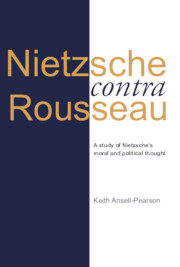Book contents
- Frontmatter
- Contents
- Preface
- Note on the texts and list of abbreviations
- Introduction
- 1 Nietzsche contra Rousseau
- 2 Civilization and its discontents: Rousseau on man's natural goodness
- 3 Squaring the circle: Rousseau on the General Will
- 4 Nietzsche's Dionysian drama on the destiny of the soul: on the ‘Genealogy of Morals’
- 5 Zarathustra's descent: on a teaching of redemption
- 6 Bending the bow: great politics, or, the problem of the legislator
- Conclusion
- Notes
- Bibliography
- Index
2 - Civilization and its discontents: Rousseau on man's natural goodness
Published online by Cambridge University Press: 03 May 2011
- Frontmatter
- Contents
- Preface
- Note on the texts and list of abbreviations
- Introduction
- 1 Nietzsche contra Rousseau
- 2 Civilization and its discontents: Rousseau on man's natural goodness
- 3 Squaring the circle: Rousseau on the General Will
- 4 Nietzsche's Dionysian drama on the destiny of the soul: on the ‘Genealogy of Morals’
- 5 Zarathustra's descent: on a teaching of redemption
- 6 Bending the bow: great politics, or, the problem of the legislator
- Conclusion
- Notes
- Bibliography
- Index
Summary
‘Your goodness must have some edge to it, – else it is none.’
R. W. Emerson, ‘Self-Reliance’ (1841)INTRODUCTION TO ROUSSEAU'S POLITICAL THOUGHT
Rousseau's political philosophy attempts a novel solution to the antinomies of modern political life – the oppositions of man and citizen, desire and reason, freedom and necessity, individuality and community – and was to have a tremendous impact on modern German thought, notably Kant, Hegel, Schiller, and Marx. Rousseau's political philosophy is frequently presented in terms of either a liberal, or a totalitarian, response to modern political life. He is seen, on the one hand, to extol the primacy of individual liberty, while, on the other, to sacrifice the liberty of the individual to the authority of the State. Thus, several commentators have argued that there is a contradiction within Rousseau's thinking on the individual and society. It has been suggested, for example, that whereas the Discourse on the Origin of Inequality (1755) offers an eloquent account of the rights of the individual, the Social Contract (1762) proposes the total subordination of those rights to the demands of the State.
However, this construal of Rousseau's political thought fails to recognize its unique nature, which lies in the fact that, although it begins with the same individualistic premises as the liberal tradition of modern political thought (namely, Hobbes and Locke), it sees the goal of the res publica, or commonwealth, not merely in prudential terms but, rather, in moral ones.
- Type
- Chapter
- Information
- Nietzsche contra RousseauA Study of Nietzsche's Moral and Political Thought, pp. 53 - 77Publisher: Cambridge University PressPrint publication year: 1991



